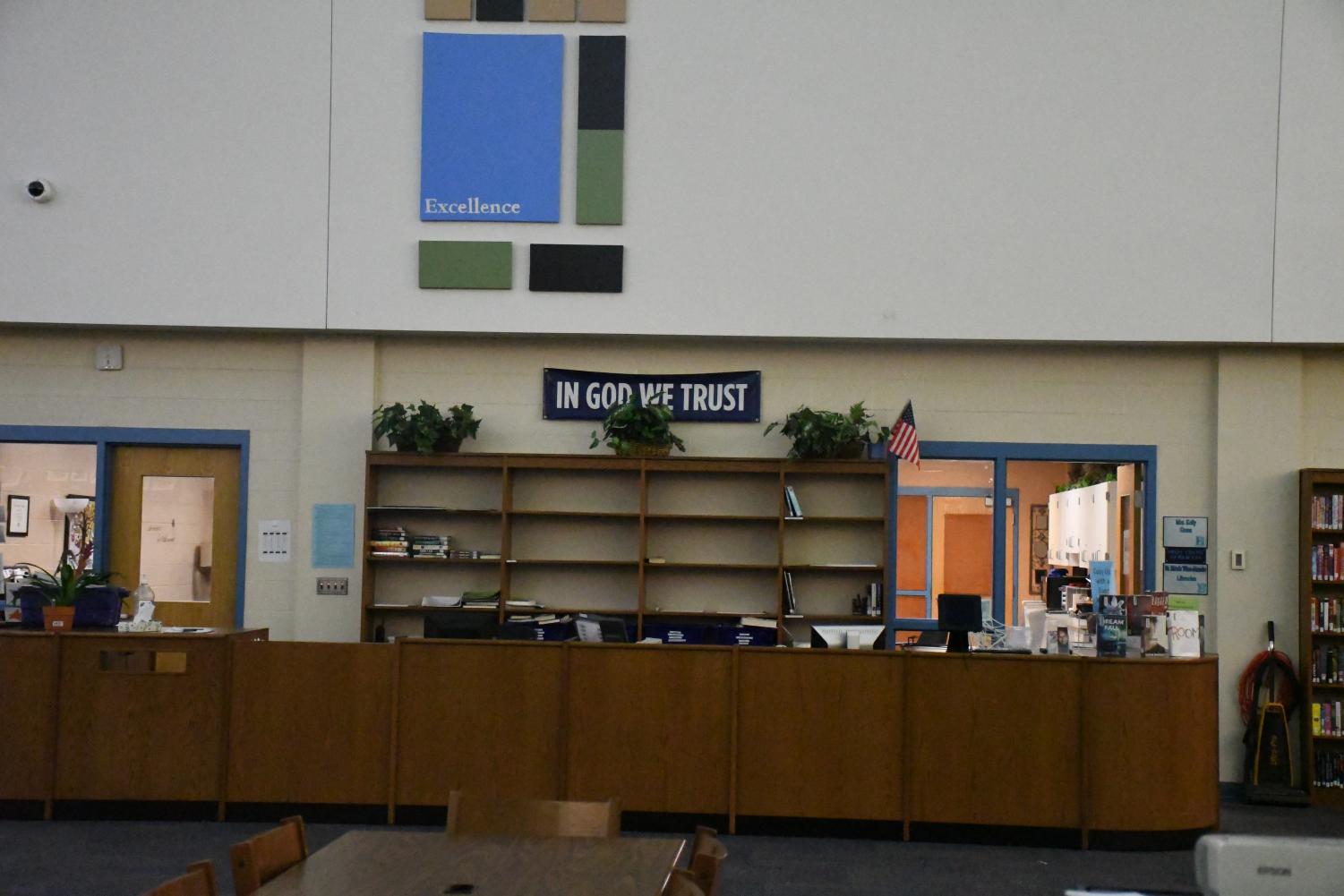‘In God We Trust’ banner required by state law
Most students indifferent to new bill which requires national motto in schools
March 2, 2020

The national motto, “In God We Trust,” is displayed on a banner in the school library to comply with House Bill 46, which became a law last year with the support of every Boone County politician.
When Boone students returned to school from summer break, one of the first changes they may have noticed was the addition of a blue banner in the library that reads “In God We Trust.”
The banner is a direct result of House Bill 46. Sponsored by Rep. Brandon Reed of Hodgenville, the law requires the national motto to be displayed in a prominent location in all Kentucky schools.
The bill passed through the House with a vote of 72 to 25 on Feb. 27, and was instituted at the start of the 2019-20 school year.
Boone County legislators Adam Koenig, C. Ed Massey, Sal Santoro, and Diane St. Onge all voted for the installation of the national motto in Kentucky schools. Senator John Schickel voted against the bill when it reached the state senate.
Under the bill, the form of the motto is not limited to banners.
Boone principal Tim Schlotman said that it was ultimately the decision of the central office to purchase the banner and place it in the library.
Schlotman then declined to comment on any questions regarding his personal stance on the law.
The bill’s sponsor sees a need for the motto in schools.
“In a time of rampant drug use, increasing school violence, and mounting cases of suicide among our youth, we need God in our schools now more than ever,” Reed told the Lexington Herald-Leader in an interview.
Reed did not respond to any of The Rebellion’s attempts to reach out for an interview regarding his opinions and reasons behind initiating the bill.
“In God We Trust” has been the country’s national motto since 1956, and is featured on a variety of platforms nationwide.
However the motto, and more specifically the banner, has brought forth some controversy.
Juniors Nathan Nguyen and Savannah Briedis said that the banner does not affect them personally, but that it could offend others.
“I feel that school and religion should be separate,” Briedis said. “For someone who doesn’t (believe in God, the bill) may be distracting or make them feel uncomfortable.”
Nguyen believed that the concept of the bill was not a great idea for public schools and would instead make more sense in a private school, where more students have similar religious beliefs.
Senior Claudia Read said she strongly disliked the banner because the belief in God is “not a universal concept.”
She did, however, appreciate that the motto was seemingly hidden away in the library, rather than in the lobby or commons.
History teacher Alison Sutton thought that it was a unique choice to put the banner in the library, and that it “makes (her) wonder if citizens know about it.”
Sutton also said that she tries not to notice the banner, but that she does “wonder how students who don’t worship a Christian god feel (about the motto being on display).”
“I think if (the bill) is what the peoples’ legislature has passed, (then) that’s (what is) supposed to represent the peoples’ opinion,” Sutton said.
In the end, however, Sutton said that it is not her place to comment, but if people have a strong opinion on the issue, then they should contact the school board.
The vast majority of the students interviewed did not show strong feelings one way or the other about the banner. That was more or less how junior Binta Ba felt.
“I don’t think (the banner) is offensive because it’s on money, so people are used to seeing it,” she said.
Ba is Muslim and said that she saw no issue or offense in the banner, nor had she paid much attention to it.